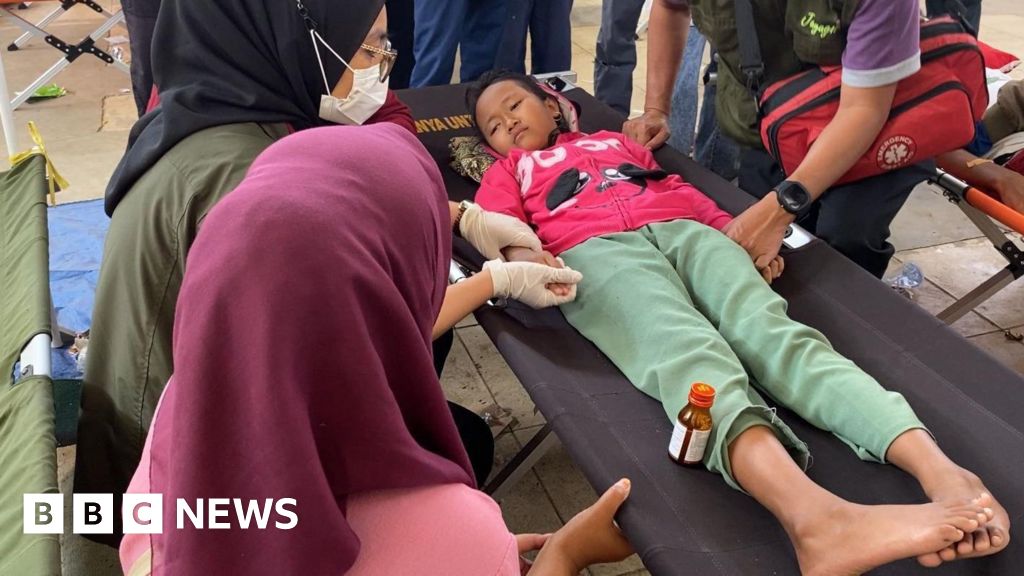Top Stories
Over 1,000 Children Ill from Free School Lunches in Indonesia

More than 1,171 children have fallen ill after consuming free school lunches in Indonesia this week, raising significant health concerns about the government’s nutritious meals programme. This alarming incident follows a previous outbreak that affected around 800 students last week across West Java and Central Sulawesi provinces. The programme, championed by President Prabowo Subianto, aims to provide free meals to 80 million schoolchildren but has faced criticism due to a series of mass food poisoning events.
Yuyun Sarihotima, head of West Java’s Cipongkor Community Health Center, confirmed the latest figures to BBC Indonesia. The victims reported symptoms including stomach aches, dizziness, nausea, and unusual shortness of breath. This week’s incidents began on Monday in Cipongkor, where approximately 475 students initially fell ill. By Wednesday, another outbreak in the same area impacted an additional 500 students.
Concerns about the safety of the programme have intensified, leading non-governmental organizations to call for its suspension. Muhaimin Iskandar, the Coordinating Minister for Community Empowerment, stated on Wednesday that “there are no plans to stop it.” Previous cases of food poisoning linked to the programme have pointed to negligent food preparation as a contributing factor.
The recent meals reportedly included soy sauce chicken, fried tofu, vegetables, and fruit. Past incidents have been attributed to expired ingredients and even the serving of fried shark. Dadan Hindayana, head of Indonesia’s National Nutrition Agency, indicated that the latest outbreak in Cipongkor was due to a “technical error” by the Nutrition Fulfillment Service Unit (SPPG), which has since been suspended.
The National Narcotics Agency revealed that from January to September 22, there were 4,711 cases of food poisoning related to free school lunches, predominantly on the island of Java. In contrast, the Indonesian Education Monitoring Network (JPPI) reported a higher figure of 6,452 children affected as of September 21. Ubaid Matraji, JPPI’s National Coordinator, emphasized the need for the government to declare an outbreak and conduct a thorough evaluation of the programme.
While some advocate for direct funding to parents to prepare meals at home, this suggestion has been dismissed by the National Narcotics Agency. Globally, initiatives providing free meals to students have shown to enhance health, academic performance, and attendance. Yet, Indonesia’s ambitious $28 billion programme has faced scrutiny over food safety and the growing public dissatisfaction that has sparked protests.
President Prabowo has positioned this meals initiative as a critical strategy to combat child malnutrition, particularly stunting, which affects one in five children under five in Indonesia. He claimed, “Through this initiative, our children will grow taller and emerge as champions,” during his campaign in 2023. Since his inauguration in October, the programme has been a focal point of his leadership, alongside other populist policies such as new housing and free medical check-ups.
Despite initial popularity, with approval ratings at 80% after his first 100 days, concerns over the programme’s effectiveness persist. Maria Monica Wihardja, a visiting fellow at ISEAS-Yusof Ishak Institute, noted that while the initiative is “well-intentioned,” there is “no evidence” demonstrating a widespread need for such a programme. A national survey indicated that less than 1% of households experienced food insecurity in the past year.
The financial implications of the programme are substantial, with over $10 billion allocated for free school meals this year alone. For comparison, India spends $1.5 billion annually to feed 120 million children, while Brazil’s programme serves around 40 million students at a similar cost. Critics argue that the scale of Indonesia’s initiative raises the potential for corruption, with large-scale social assistance historically plagued by such issues. Muhammad Rafi Bakri, a research analyst at Indonesia’s audit board, highlighted the risks posed by the programme’s considerable budget, suggesting it could become “a goldmine for corrupt officials.”
As authorities grapple with the fallout from this week’s mass food poisoning incidents, the future of the nutritious meals programme remains uncertain, demanding immediate attention to ensure the safety and health of Indonesia’s schoolchildren.
-

 Lifestyle4 months ago
Lifestyle4 months agoHumanism Camp Engages 250 Youths in Summer Fest 2025
-

 Business5 months ago
Business5 months agoKenvue Dismisses CEO Thibaut Mongon as Strategic Review Advances
-

 Sports4 months ago
Sports4 months agoDe Minaur Triumphs at Washington Open After Thrilling Comeback
-

 Sports5 months ago
Sports5 months agoTupou and Daugunu Join First Nations Squad for Lions Clash
-

 Top Stories5 months ago
Top Stories5 months agoColombian Senator Miguel Uribe Shows Signs of Recovery After Attack
-

 World5 months ago
World5 months agoASEAN Gears Up for Historic Joint Meeting of Foreign and Economic Ministers
-

 Health4 months ago
Health4 months agoNew Study Challenges Assumptions About Aging and Inflammation
-

 Business5 months ago
Business5 months agoOil Prices Surge Following New EU Sanctions on Russia
-

 Entertainment4 months ago
Entertainment4 months agoDetaşe-Sabah Violin Ensemble Captivates at Gabala Music Festival
-

 Entertainment4 months ago
Entertainment4 months agoBaku Metro Extends Hours for Justin Timberlake Concert
-

 Top Stories5 months ago
Top Stories5 months agoRethinking Singapore’s F&B Regulations Amid Business Closures
-

 Business5 months ago
Business5 months agoU.S. House Approves Stablecoin Bill, Sends to Trump for Signature









